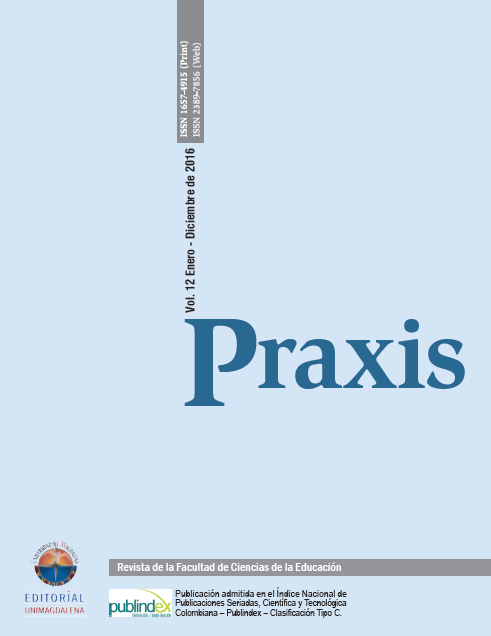Abstract
This research focuses on two main aspects: the virtual learning objects as ICT tool for teaching and independent learning; with this we pursue to establish the relevance or not, of certain digital tools, represented as LO, that had certain characteristics, for support in the classroom, so that they fulfill an educational role for the teaching and learning processes, which demands methodologies and knowledge by the teacher and the right attitude by the student. Of course, to achieve that, the overall objective of the research is to “Evaluate the incidence of Virtual Learning Objects as digital didactic tool in teaching and in the development of autonomous learning in English in high school students of the Institution Bertha Gedeón Báladi “which was the chosen population. The methodology used was under the qualitative and quantitative approach with descriptive and evaluative. The research involved 54 students high school; the instruments used for data collection were surveys, interviews and direct observation, the validity of which was guaranteed by implementing a table triple entry into the categories were established, indicators, descriptors and instruments for data collection appropriate to the study methodology. For information analysis methodological triangulation that gave a more complex view of reality, therefore more complete and closer to it was used. The results revealed the high incidence of OVA as a motivating tool in the autonomous learning of the student and their preference to traditional materials, instead of resources lacking interactivity or multimedia.References
André, B. (1992). De l'autonomisation à l'autonomie en didactique des langues non maternelles. En : Porcher, L. (Coord.) Le français dans le Monde: les autoapprentissages (pp. 66-74). Paris : Clé International.
Area, M. & Adell, J. (2009). ―eLearning: Enseñar y aprender en espacios virtuales. En J. De Pablos (Coord): Tecnología Educativa. La formación del profesorado en la era de Internet. Aljibe, Málaga: 391-424.
Cabero, J. (2006). Bases pedagógicas para la integración de las TIC en Primaria y Secundaria. Universidad de Sevilla: Grupo de Tecnología Educativa de la (http://tecnologiaedu.us.es/ bibliovir/pdf/ Bases - 456.pdf) (04-09-2009).
Cabrales, M., Cáseres, J. & Feria, I. (2009). La autonomía en el aprendizaje del inglés en los estudiantes del ciclo básico del programa de lenguas modernas de la universidad de san buenaventura. Universidad de San Buenaventura Cartagena, Cartagena de Indias, Colombia.
Castell, M., Adell, J., & Area, M. (2013). Ludoliteracy, creación colectiva y aprendizajes. II Congreso internacional educación mediática y competencia digital. Barcelona. España.
Holec, H. (1991). Autonomie de l’apprenant: de l’enseignement à l’apprentissage. CRAPEL, Université de Nancy 2. Education permmanente No. 107: 3.
Marquez, P. (2000). Competencias básicas y alfabetización digital. Universidad Autónoma de Barcelona. Recuperado de: http://peremarques.pangea.org/competen.htm
Microsoft. (2014). "Habilidades Siglo XXI su impacto en la práctica áulica". Curso "Transformando la práctica educativa docente". Qualitas Red Tecnologica.
Müler-Verweyen, M. (1999). Reflections as a means of acquiring autonomy. EN: COTTERAL, Sara and CRABBE, David (Ed.). Learner autonomy in language learning: Defining the field and effecting change. Frunkfurt: Peter lang: 79-80.
Ramírez, M. S. & Valenzuela, J. R. (2010). Objetos de aprendizaje abiertos orientados a desarrollar competencias docentes para la Sociedad del Conocimiento. Ponencia presentada en Edutec 2010 "E--‐learning 2.0: Enseñar y Aprender en la Sociedad del Conocimiento", Bilbao, España.
Rojas, F. (2001). Enfoques sobre el Aprendizaje. Universidad Simón Bolívar. Recuperado de http://especializacion.una.edu.ve/teoriasaprendizaje/paginas/Lecturas/Unidad%202/rojas2001.pdf
Wiley, D. (2000). Connecting learning objects to instructional design theory: a definition, a metaphor, and a taxonomy. The Instructional Use of LEARNING OBJECTS: Online Version 2000. Recuperado de http://www.reusability.org/read/

